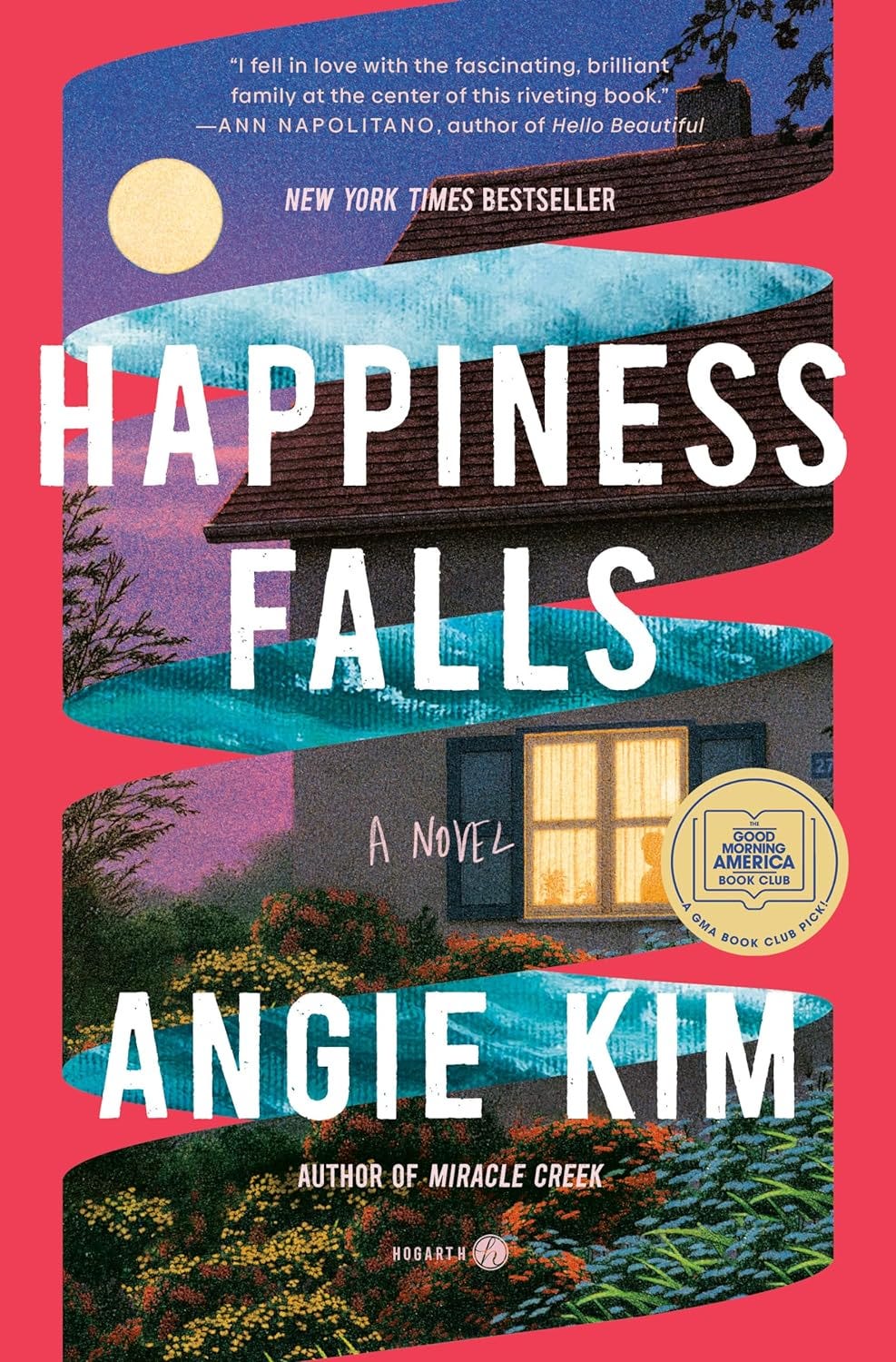Angie Kim on Happiness, Venn Diagrams (!), and Defying Genre Expectations
A/V Special: the author of the bestselling literary/mystery novel, Happiness Falls, dishes on navigating expectations, DNF readers, and tools she uses to write her complicated, character-rich plots
With Happiness Falls, which landed on the NYT bestseller list in September, Angie Kim leapfrogged over the sophomore novel dilemma, earning even more raves for this genre-defying novel than she did for her debut, Miracle Creek. But as she was willing to candidly share with us, that doesn’t mean every reader loves this book. No book pleases every reader, obviously, but let’s admit, whether you are a writer or a reader, those negative “stick-to-the-formula” nellies can really get on one’s nerves.
The very same elements that landed Kim a great book deal for her much-anticipated follow-up—including the voice of her opinionated, intelligent, hyperlexical main character, 20-year-old Mia—turn off a small subset1 of readers2. As does the fact that Happiness Falls refuses to move at a commercial thriller’s breakneck pace (it has footnotes!) or restrict itself to the twists and turns of its missing persons plot.
Happiness Falls begins with a fascinating dilemma. The only person who may know what happened to Mia’s father is Eugene, Mia’s brother: a 14-year-old who is unable to speak due to a rare genetic disorder. From there, the novel unfolds into an exploration not only of disability—especially the question of why society insists on equating verbal skills with intelligence—but of Mia’s (and Angie Kim’s) wide-ranging passions and obsessions, from music and linguistics to psychology and philosophy, including how one can purposefully manage one’s own happiness levels.
In a way, the author admits, the mystery plot is really just a Trojan horse or container for these more essential investigations of the mind and heart. But make no mistake: the mystery itself held this reader’s attention to the very end, especially because one comes to care so deeply for the family at the heart of this poignant and whip-smart novel.
A first for Present Tense, we share with you the full interview in unabridged audio form, and two video snippets (taken from the same interview) of specific utility for writers and dedicated readers who want to know how books get written as well as how authors manage to maintain their own happiness levels during the whirlwind process of getting published.
Let us know if you enjoyed this interview in the comments, and whether you prefer audio to video to transcript. We’re here to serve your suspense fiction needs! (Plus, we are greatly assisted by the encouragement.)
P.S. There’s a Goodreads giveaway for Andromeda’s forthcoming suspense novel, The Deepest Lake (Soho Crime, May 2024), going on now. Catch it in the next three days, before it expires!
AUDIO: Angie Kim in conversation with Andromeda Romano-Lax
Topics covered: Mia’s voice and DNF readers, crossover books and literary sensibilities, Tim O’Brien’s In the Lake of the Woods as inspiration, Eugene’s audiobook voice and the talents of “Autastic Tom,” how Angie writes, the happiness quotient explained, and more.
In the audio, Angie references a Good Morning America video (forward to minute 2:00 to see her students at the I-ASC—International Association for Spelling as Communication)— and the Autastic Tom video, in which he explains why he considers himself a non-speaker even though he talks frequently.
VIDEO EXTRAS FOR THE WRITERS (AND THE WRITING-CURIOUS) IN THE HOUSE
VIDEO #1: Diagrams, spreadsheets, and Angie’s road trip metaphor. Secrets inside!
VIDEO #2: Happiness, and are we better off lowering our expectations and assuming the worst? Angie presents another option.
Don’t forget to let us know your preferences for interview formats going forward. Audio only, video, combination, transcript only, other?
It really is a small subset (7%). Ninety-three percent of readers on Goodreads currently give Happiness Falls three to five stars. So why even start here? Because our interviewee did, and because this is the type of conversation that writers *privately* have all the time, and inviting you into the “nerdy/neurotic/people-pleasing-yet-stubborn-enough-not-to-please-EVERY-reader” world of our favorite suspense writers is what Caitlin and I aim to do every week.
HERE’S SOMETHING COINCIDENTAL. I also just finished reading Birnam Wood by Eleanor Catton—would love to talk about this book with PT readers!—and it has nearly the same number of ratings, the same overall average, and precisely the same number of one and two-star reviews (7%). It’s an idea-fuelled novel and its pacing is slower at first as we get to know the many characters, speeding up in the second half. I thoroughly enjoyed both books. I also understand that someone opening a book marketed as a “mystery” or, in the case of Birnam Wood, “eco-thriller,” will probably be nodding their heads for the first quarter of the book until the pace picks up. Let us know if you can think of other books you’d recommend in this category and what we should call it. Slow-Burn Suspense? Trojan Horse Thriller? Character-Forward Crime? My third nominee: Rebecca Makkai’s I Have Some Questions for You.






I LOVE a Trojan Horse thriller! What a great name for it! I think they're the best (and Kim is one of the greatest at it!) when books can bridge the gap between several genres and manage to pull out surprises when you aren't expecting them, especially when they're more quiet and not a jump scare like a traditional thriller.
I’m so excited to check out this interview! Happiness. Falls is in my TBR pile and was an instant-buy for me. I loved Miracle Creek so much!
P.S. I think slow-burn suspense is my preferred genre, now that I see how you’ve broken it down. Birnam Wood and I Have Some Questions For You were two of my favorite reads this year! Both were 5 star books for me. I need a crowdsourced list of other slow-burn suspense!